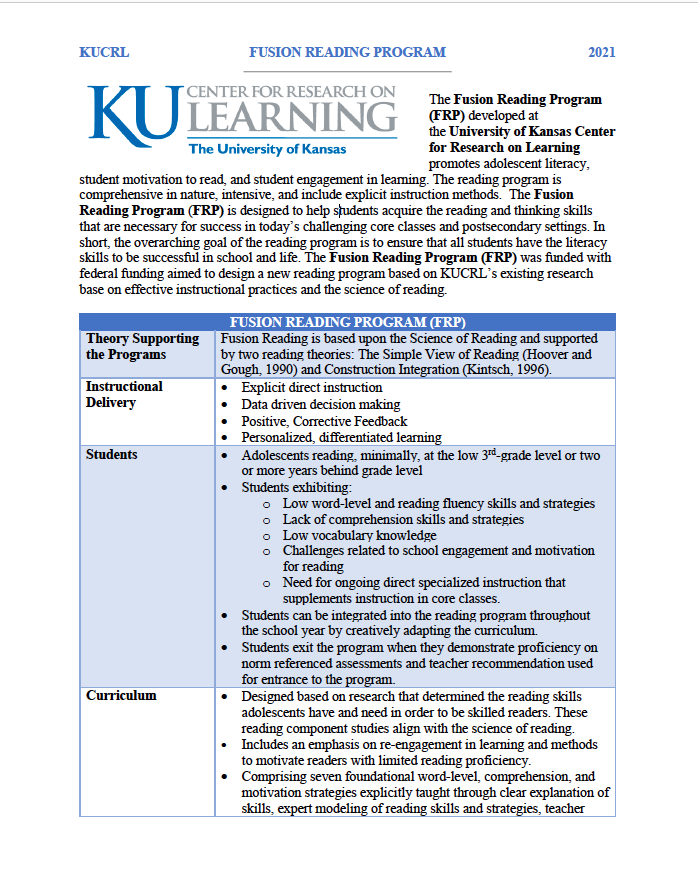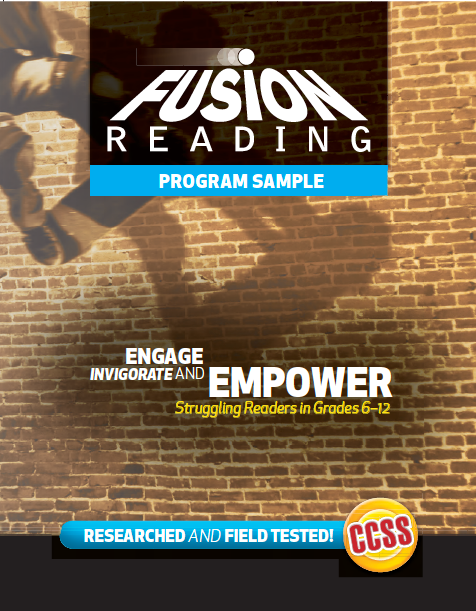Fusion Reading

|

|
Technical Report: Fusion Reading Program - Hock, Brasseur-Hock, Deshler, 2013
Fusion and Xtreme Reading Comparison
Parent Q and A (Spanish)
Sample Parent Letter (Spanish)
Teacher Expectations for Professional Learning and Implementation
Think Reading Planning Document
Washburn, J. (2023). Monitoring reading component skills during a word level intervention for adolescents with limited reading proficiency. Learning Disabilities Research and Practice. https://doi.org/10.1111/ldrp.12308
Stratenotes Volume 28 Issue 1: KUCRL Reading Programs
- Checklists
Video Resources
- 2021 SIMposium: Design and Implementation of Online Fusion Reading for Adolescents with Limited Reading Proficiency - Brasseur Hock, Zhang
-
This presentation is to demonstrate the development of an online adaptive, comprehensive, and research-based adolescent reading program called Fusion Reading Program (FRP) that holds the potential to provide personalized learning for adolescents with limited reading proficiency. To respond to the sudden shift to online learning and teaching, we have collaborated with Fusion Reading (FR) leaders and teachers in redesigning FRP drawing upon the current science and theories of reading and online learning. In this presentation, we will describe how the online FRP integrates two core design components to better support students’ personalized learning needs. These components include 1) explicit and direct instruction and 2) Universal Design for Learning (UDL). Furthermore, we will demonstrate how we leverage varying functionalities of Canvas as the learning management system to design and deliver instructional units of the online FRP.
Learner Objectives:
At the end of this session participants will:
Gain an understanding of which Fusion Reading critical teaching components were needed to impact teachers online instructional needs. Gain an understanding of effective design features of online learning using the framework of Universal Design for Learning to enhance the Fusion Reading program in an online format.Read the article -KUCRL_Online Fusion Reading
Watch a video-clipGo beyond a model; reveal a Think Aloud

- 2019 SIMposium: Fusion Reading Personalized Professional Development - Irma Brasseur Hock
-
This session will provide participants with an opportunity to understand how to provide Fusion Reading personalized professional learning experiences when PD time is limited. A demonstration of the Fusion Reading online professional development modules will be shared along with examples of how this was implemented in the State of Virginia.
2016 SIM Conference: Fusion Reading: Irma Brasseur Hock, Sue Woodruff Watch VIDEO
- 2016 SIM Conference: Learning to Read with KUCRL- Fusion and Xtreme Reading Programs - Irma Brasseur Hock, Patty Graner
-
Watch Entire Video Excerpt Cut
Table comparing Fusion and Xtreme
Fusion and Xtreme: Similarities and Differences doc.
Learning to Read with KUCRL ppt: Fusion and Xtreme Reading
- 2012 SIM Conference: Dubuque Iowa: Our Journey to Sustain Fusion Reading
-
During this session participants will learn about the partnership between Dubuque Community Schools and KUCRL to implement and sustain the Fusion Reading (FR) Program over the past 3 years. Participants will have the opportunity to learn about, how FR professional development and coaching model impacted teacher fidelity and student outcomes, and how the design of a Fusion Reading Academy has lead to sustainability. In addition, a brief overview of the Fusion Reading Program will be presented. Teachers and administrators involved in this effort will be present to share their experiences.
- 2010 SIM Conference: Level 3 of the CLC: Fusion Reading as a Supplemental Reading Class: Micke Hock, Irma Brasseur Hock
-
The overriding objective for this session is to present the Fusion Reading curriculum. We will briefly discuss characteristics of struggling adolescent readers and the multiple clusters of reading profiles they present; share an overview of the Fusion Reading curriculum and instructional methodology and how it responds to the needs of struggling readings; and present the results of studies conducted to test the program's effectiveness. Fusion Reading is a comprehensive program that includes strategies for increasing reading motivation, decoding, word identification and fluency. Additionally, the program includes reading comprehension strategies for paraphrasing, summarizing, generating questions, drawing inferences, and recognizing text structures as well as a vocabulary component that focuses n learning vocabulary in context and through class discussion. The instructional methodology is based ion explicit instruction with extensive practice and feedback on student learning of reading skills and strategies.
- 2010 SIM Conference: Level 2 of the CLC: Teaching Fusion Reading in the General Ed Classroom for Vocabulary and Reading - Mike Hock, Irma Brasseur Hock
-
During this session, we will share our initial thinking about how to move selected components of Fusion Reading into the general education classroom. We will focus on tow interventions: the Fusion Reading Vocabulary process and using Thinking Reading as a framework for content teachers to describe, demonstrate, and guide students in the use of general reading strategies that are content-area specific. If you are interested in a creative experience with the opportunity to engage in the further development of Level 1 strategies, this session is for you. If you are in need of a published manual on Level 1 strategies, this session may not meet your needs.
- 2009 Preconference: Fusion Reading: An Overview of a Comprehensive Evidence-Based High School Reading Program - Mike Hock, Irma Brasseur Hock, Don Deshler
-
New KUCRL research on reading instructions for adolescent struggling readers has yielded interesting results and let us to develop a reading program called Fusion Reading. The program includes strategies for increasing reading motivation, decoding, word identification, and fluency; reading comprehension strategies for paraphrasing, summarizing, generating questions, drawing inferences, and recognizing text structures; a vocabulary component focused on learning vocabulary in context and through class discussion; and an instructional methodology based on explicit instruction with extensive practice and feedback. This session wills share the Fusion Reading curriculum and our research findings. Participants will be asked to help conceptualize the professional development model and activities used to support implementation of Fusion Reading at the school and classroom level.
2009 SIM Conference: Fusion Reading, A Classroom Experience - Mike Hock, Irma Brasseur Hock Watch Video
2006 SIM Conference: Results of the First Year of a 2-Year Intensive Reading Course for High School Students - Mike Hock, Irma Brasseur-Hock Watch Video
